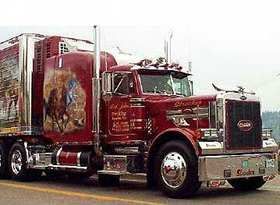Reefer Vs Van For Rookie
Topic 26901 | Page 1
Hello
My son drives for Wil-Trans pulling Prime Reefer trailers. He has mentioned some wait times, but for him it works. He has been solo about 5 months now. He has nothing but good things to say for his company. He went through there Paid CDL training.
Best of luck.
CDL:
Commercial Driver's License (CDL)
A CDL is required to drive any of the following vehicles:
- Any combination of vehicles with a gross combined weight rating (GCWR) of 26,001 or more pounds, providing the gross vehicle weight rating (GVWR) of the vehicle being towed is in excess of 10,000 pounds.
- Any single vehicle with a GVWR of 26,001 or more pounds, or any such vehicle towing another not in excess of 10,000 pounds.
- Any vehicle, regardless of size, designed to transport 16 or more persons, including the driver.
- Any vehicle required by federal regulations to be placarded while transporting hazardous materials.
Reefer:
A refrigerated trailer.
Wil-Trans:

Darrel Wilson bought his first tractor in 1980 at age 20, but, being too young to meet OTR age requirements, he leased the truck out and hired a driver.
Through growth and acquisition, Wil-Trans now employs over 200 drivers, and has a long-standing partnership with Prime, Inc. to haul their refrigerated freight. The family of businesses also includes Jim Palmer Trucking and O & S Trucking.
You can make equally good money with both. The main differences between most refrigerated and dry van gigs are:
- Refrigerated loads are longer on average than dry van loads
- Refrigerated carriers tend to cover a larger area of the country than dry van
- Dry van companies tend to have more opportunities for home time, like weekends at home, where refrigerated companies normally keep you out for 3 - 4 weeks at a time
- Dry van companies tend to have more options for different divisions or dedicated accounts than refrigerated
So if you want to be home more often or stay in a particular region of the country, dry van is a better fit. If you want to stay out longer and see more of the country, refrigerated is the better fit.
You can make great money with either one. Every company has its own characteristics and offerings, so speak with recruiters about what's important to you before deciding.
Dry Van:
A trailer or truck that that requires no special attention, such as refrigeration, that hauls regular palletted, boxed, or floor-loaded freight. The most common type of trailer in trucking.
Thanks fellas. Something else I forgot to ask was I've heard there's a considerable amount of more night driving with reefer. Is that true?
Reefer:
A refrigerated trailer.
Thanks fellas. Something else I forgot to ask was I've heard there's a considerable amount of more night driving with reefer. Is that true?
I wish. I prefer driving at night ten times over driving during the day. However, I always seem to end up driving during the day most of the time. Even when I can manipulate things a little to drive at night, I end up right back on day driving. Others might have a different experience though. I'm just one example.
Reefer:
A refrigerated trailer.
There's no clear-cut generalization you can make with day vs night driving for reefer vs dry van. There are tons of companies out there, all of which have different divisions, customers, and operations. It's more about the company you're with and the division you're in than it is the type of freight you're hauling.
Dry Van:
A trailer or truck that that requires no special attention, such as refrigeration, that hauls regular palletted, boxed, or floor-loaded freight. The most common type of trailer in trucking.Reefer:
A refrigerated trailer.

Walmart Grocery Dedicated... you can have it both ways.
Prime reefer I get about 50% drop n hook. We are a big company, some smaller reefer companies may not have the large number of trailers for drop and hooks. We get detention after 2 hours and i just make that 2 hours part of my 8/2 split. no biggie.
if we need to run dry products we just turn the reefer off. About 20% of my loads are dry.
My load length varies from month to month. In June my average load was 480 miles.... lots of being at customers everyday. In Sept and Oct my average was 1100 miles per load.
I usually get around 2800 miles per week.
I hope this helps.
Reefer:
A refrigerated trailer.
Drop And Hook:
Drop and hook means the driver will drop one trailer and hook to another one.
In order to speed up the pickup and delivery process a driver may be instructed to drop their empty trailer and hook to one that is already loaded, or drop their loaded trailer and hook to one that is already empty. That way the driver will not have to wait for a trailer to be loaded or unloaded.
New Reply:
New! Check out our help videos for a better understanding of our forum features

















Preview:








 TT On Facebook
TT On Facebook
Hi Everyone,
I'm considering becoming an OTR trucker and I'm wondering if the hassle involved with reefer (long wait times, lots of live loads/unloads, etc.) is worth the extra few cents per mile. I'm thinking either Prime, who starts at .45 cpm or Werner who doesn't have exact starting pay on their website but I'm assuming its probably in the neighborhood of .38-.40 cpm.
Thanks everyone!
OTR:
Over The Road
OTR driving normally means you'll be hauling freight to various customers throughout your company's hauling region. It often entails being gone from home for two to three weeks at a time.
CPM:
Cents Per Mile
Drivers are often paid by the mile and it's given in cents per mile, or cpm.
Reefer:
A refrigerated trailer.